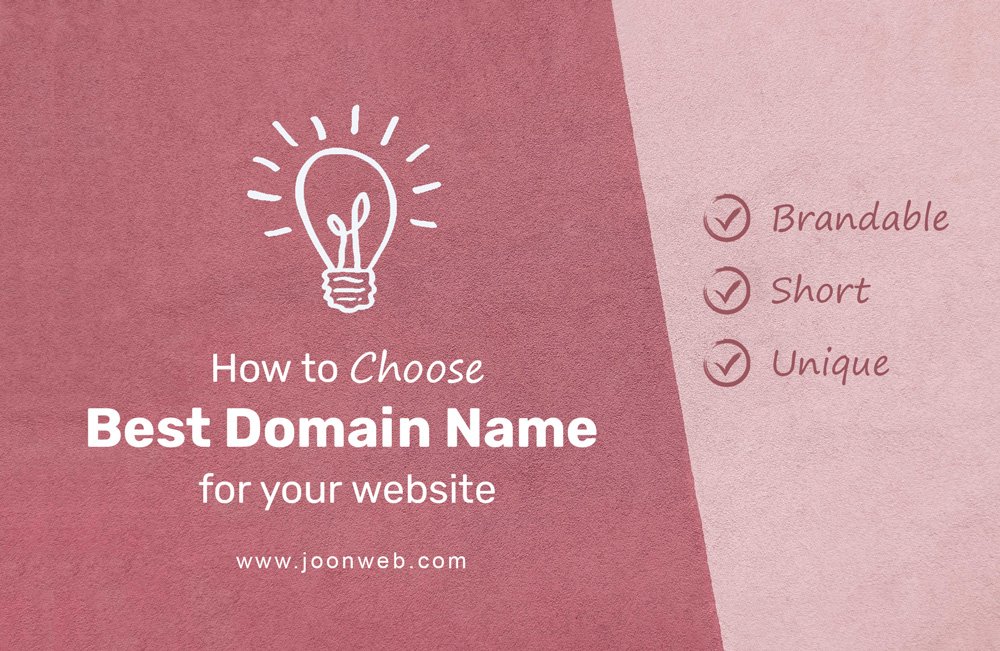A domain name is a one-of-a-kind, easy-to-remember address used to visit websites, such as 'google.com' or 'facebook.com.' Users can connect to websites using domain names, thanks to the DNS system.
It takes a lot of thinking and attention to figure out how to choose a domain name, just like it takes a lot of thought and consideration to figure out how to choose a company name.
If you want to know about domain names & their types, read here. If you are wondering 'How to choose the best domain name for your website?', Dont worry, you have come to the right place. Given below are 10 easy steps to choose a domain for your website.
Table of Contents
2. Impact Of A Domain Name On Your Website
3. Follow These 10 Easy Steps To Choose The Best Domain Name For Your Website:
5. Stay Away From Numerals & Dashes
6. Use A Domain Name Generator For A Unique Name
9. Select The Appropriate Domain Extension
Importance Of Domain Name
Your domain name is your online identity; choose one that not only fits your company but is also easy to remember and promote. We all know that a domain name can never completely change the content.
However, domain names, commonly known as URLs, play an important part in your site's brand-ability and legitimacy, and can even affect its search engine rating. To truly comprehend what a domain name is, you must first recognize that it affects every aspect of your internet presence:
Impact Of A Domain Name On Your Website
- A snappy and personalized URL, which serves as your brand's internet address, will help to the professionalism and authoritativeness of your site, making your organization appear more polished.
- Make your website easy to locate: By choosing a memorable domain name for your website, you may make it more memorable to visitors and make it easier for them to find it. More people will see your website if it has a domain that fits your business and is easy to remember.
- Boost your search engine optimization: Finally, from an SEO (Search Engine Optimization) standpoint, your domain name might play a role. While there are many elements that go into the SEO of your website, your domain name is one that should not be overlooked.
Follow These 10 Easy Steps To Choose The Best Domain Name For Your Website:
1. Make It Simple To Type
Before visiting your page, you don't want potential visitors to ponder little matters like spelling. As a result, choose a domain name that will roll off the tongue - and fingers - easily. It's advisable to stay away from words that are frequently misspelled or require a second look before pronouncing.
Ask a few people to test your domain name and see if they can get it right on the first try. If they're having trouble, try an alternative name.
Use a mix of your first and middle names instead of your last name if you want to use your personal name as the domain but your last name's spelling isn't apparent. Alternatively, make a moniker for yourself by combining your first name and your specialty, such as "drawwithdrake."
2. Stay Away From Numerals & Dashes
Your domain name, unlike a password, should not be a string of characters that only you understand. As a result, avoid utilizing special characters like hyphens and numerals.
So, for example, "gr8shakes4all" would be a particularly poor domain name. Numbers and hyphens are frequently misunderstood and difficult to remember and type.
When it comes to numbers, individuals are torn between using the numeral digit or spelling them out (is it a ten or a ten?).
Hyphens, on the other hand, are easy to miss or misplace while typing in a site URL, and are not always readily available on mobile keyboards. As a result, it's advisable to exclude them from your domain entirely.
3. Use A Domain Name Generator For A Unique Name
Start your search for a domain name for your website with a list of alternatives rather than a blank page to make the brainstorming process much easier and more effective.
You may receive a lot of suggestions for domain names by using a domain name generator based on keywords or phrases linked to your brand.
4. Keep It Brief & Short
Domain names can be as long as 63 characters long in technical terms. However, a domain this long would be unwise, as it would be difficult to type and remember. Instead, keep your domain name as brief as possible.
A domain name should be between 3 and 12 characters long, with no more than 2-3 words being used as a rule of thumb. If the name you had in mind is longer than that, think about shortening it or changing it entirely.
5. Do Your Homework
Make sure you're not infringing on anyone else's domain name before you buy it. Look up competing brands in trademark and copyright databases.
Choosing a domain name that has been taken by other brands, even if only inadvertently (i.e. for purposes other than a domain name), could cause customer confusion as well as legal difficulties. As a result, it's worthwhile to take the time to make a well-informed and well-researched conclusion.
6. Select The Appropriate Domain Extension
The suffix at the end of your domain name is known as a domain extension, also known as a TLD (top-level domain). This rightmost portion of your website's URL is used to identify some of its most important aspects, such as its purpose, location, or owner.
While the most popular extensions are.com,.org, and.net, there are many others that can meet a variety of purposes and provide alternatives in the event that your initial pick is already taken. Let's look at some of these domain extensions and what they're used for.
- .com: This widely used domain name stands for "commercial" and is almost synonymous with the internet. It is the most well-known and trusted TLD, therefore it is usually the best selection when in doubt. For-profit businesses are connected with the ".com" extension. Consider the website joonweb.com.
- .net: This is the second most frequent extension, and it refers to networks. It is commonly used by service providers such as website hosting, databases, and collaboration tools.
- .org: This domain extension stands for "organization," and it is most commonly used by non-profit and charity organizations. For instance, take a look at wikipedia.org.
- .info: An abbreviation for "information," this extension is usually used for instructive or instructional websites.
- .me is a great extension for a personal brand, online resume, blog, portfolio website, or an online resume.
Must Read- COM vs .ORG vs .NET vs .IN: What Are They & Which One Is Better?
7. Stay True To Your Brand
Many diverse aspects come together to present a single unified story in a smart branding strategy. Make sure your domain name is consistent with the rest of your marketing activities, including your company website, social network handles, and overall tone and voice.
As a result, your online presence will speak the same language and send the same message across all platforms.
Your domain name can be the same as, a variation of, or a combination of your business name and a keyword (as described below). If you haven't given your company a name yet, take some time to come up with something memorable that captures the essence of your brand.
To get your ideas flowing, you can come up with fresh phrases that have a beautiful ring to them (like JoonWeb and Google), look up relevant terms in a dictionary or thesaurus, or use a business name generator.
Furthermore, regardless of how similar your domain is to your company or personal name, you must ensure that the end result is viewed as a brandable name. This will make your website address stand out and make it much easier to remember.
8. Make Use Of Keywords
You can increase your chances of appearing on Google when people search for businesses like yours by using SEO. Include a relevant term in your domain name, which is one of the greatest SEO ideas to remember.
This can assist both site visitors and search engine bots in associating your website with your primary area of expertise, allowing it to rank higher for that issue.
While keywords are valuable, they should be used sparingly and only when they fit naturally into your domain name. If not, don't force it; a domain name that is highly optimized can come across as spammy. In other words, this domain name SEO technique is beneficial but not required.
9. Consider The Long Term
If you expect your brand to flourish in the future, you need to prepare accordingly from the outset. Purchase a few variations of your domain name to keep them safe from competition and on your own.
While shuffling through various Domain name ideas, always keep in mind the long-term effects. Small businesses should always strive for a brandable domain name that is easy to pronounce.
Different domain extensions (both ".com" and ".net," for example) or comparable alternatives of the same name that can be confusing for users (such as with or without "the" at the beginning) are examples of these variants. This is especially beneficial because numerous domains can be linked to the same website.
Also, make sure that the domain name you choose will not prevent your company from growing in the future. For example, if your beauty salon presently offers nail services but you hope to expand into hairdressing and spa treatments in the future, make sure your domain name is broad enough to accommodate your future plans.
You can also buy a domain through JoonWeb
10. Act Quickly
Once you've selected your decision, you should register your domain name as soon as possible to ensure that no one else gets it first. Simply select an accredited domain registrar who will work with ICANN (Internet Corporation for Assigned Names and Numbers) on your behalf to do this. They'll safeguard your domain name and make sure it's yours and yours alone for the term of your purchase.
If you're wondering how much a domain name costs, keep in mind that rates vary depending on a variety of criteria such as the domain extension and the phrases you choose (such as securing a domain for a longer period of time). Many website hosting platforms, on the other hand, include the first year of domain registration for free.
These plans provide an all-in-one business solution by integrating both a website host and a domain registration, allowing you to design your website, acquire your domain, and use professional online tools all under one roof.






